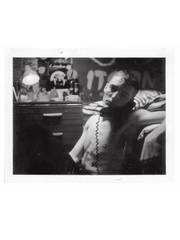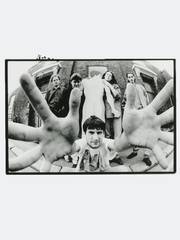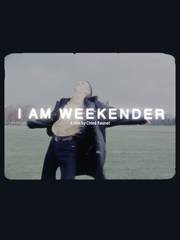Goodhood presents Magic Castles' new collection in collaboration with Heavenly Films and The BFI, to celebrate the launch of the new Chloe Raunet Documentary, 'I Am Weekender'. The Documentary accompanies the groundbreaking 1992 short film, 'Weekender', directed by WIZ. A film that explores young vulnerability and the euphoric feeling of youth in the early 90s; created alongside the track by Flowered Up, WIZ uses invasive shots to capture a vibe which is uncertain to return. We caught up with Chloe Raunet to talk about the release of her first Documentary and how it feels to be a "multifaceted creative". Check it out below...


GOODHOOD: Congratulations on your new documentary/first long format film, ‘I Am Weekender’, which goes into the making and the cultural impact of short film Weekender, directed by WIZ in 1992. Can you tell us about it?
CHLOE RAUNET: [...] Weekender was a music video for Flowered Up and is considered the first film about Acid House made from within the scene. It depicted kids doing drugs and came out just as the media / powers that be were just working themselves into a frenzy over ecstasy and partying. Both BBC and ITV banned it immediately and as a result, the film gained genuine cult status. Talk to most people of a certain age and they’ll hold it close to their hearts - Jeremy Deller, Irvine Welsh, Miranda Sawyer, Annie Nightingale, Roy the Roach, Mark Moore +++ all feature in the documentary. You watch the original now and it’s hard to believe what all the fuss was about, but it was a huge influence. It opened up the conversation and changed the way drugs and youth culture were portrayed. So my film’s about that - a film about a film (how meta).
GH: For those who don’t know, Who are you and What do you do?
CR: I guess I’m a multifaceted creative with deep roots in music. Years ago I fronted the band Battant, who shared a studio with Andrew Weatherall, before signing to underground, queer Parisian record label Kill The DJ. More recently, I’ve been producing my own brand of electronic art pop under the moniker C.A.R. The live act now consists of myself and Joni Green and we’re currently mixing the fourth album at Hermitage Studio with Nathan Ridley. On top of that, I DJ and host a monthly show on NTS Radio, ‘On The Slip Road’.
GH: You’re a musician and creative polymath in general, but how did you transition into film?
CR: My career has always made segues into journalism, podcast production, and DIY filmmaking, mostly in the form of my own music videos. As my touring schedule ground to a halt with the pandemic, I got a job creating audio visual content for a Canadian arts magazine. Off the back of that WIZ offered me the opportunity to make ‘I Am Weekender’.


GH: What did you initially set out to achieve when first approaching the make of your documentary?
CR: Initially I was brought on board to cut together a few interviews as some extra content for a Heavenly Films Blu-Ray. It was only meant to be talking heads but there was potential to do something more. As well as the restored 16mm rushes, WIZ had this insane archive of storyboards, stills plus loads of other relics from the era. It kind of snowballed from there and suddenly I was making a long-format film, which is when the BFI got involved. I’d never done anything like it - a pretty steep learning curve which I approached in a very punk / DIY way. Aside from a self-imposed restriction of what I could and could not use (limit myself to media WIZ had on hand instead of casting the net far and wide), I kinda made it up as I went along. The result is a bit like a fanzine - lots of cut and paste and discovery along the way. All the interviews were conducted via Zoom during lockdown so for the most part they looked pretty shit. This was an ongoing concern, resolved spontaneously on our last day of post.
GH: What year did you start clubbing, and how (if at all) did it differ then from clubbing in 2024?
CR: Ha! God no joke, my mum’s best friend was working as a bouncer so the first time I set foot in a nightclub I was 7. That experience ignited a fascination with dance music and discos. By 12, I was hanging out in underage jaunts, going to warehouse parties and somehow getting into the seedier clubs. This was mid-nineties so things were already becoming more commercial, but Es were still relatively new. There was an excitement that we were involved in something forbidden and fresh. It’s a lot more sanitised these days. I’m pretty sure the pills aren’t as strong and I doubt many pre-teens are drawn to bass bins in the same way I was.
GH: What’s your opinion on club culture and raving right now? We hear a mixed bag, and hear some opinions on how clubbing was better pre-phones/internet, when there was less focus from some clubs on making loads of money, and more about the love of the culture. What’s your stance?
CR: I don’t think club culture has the same significance as it did back then - as you say, it’s just another capitalist enterprise, transformed like everything by the digital age. Plus it’s been around ages. Look at where the hippies were 30 years later. Not sure I have much more of an opinion than that though. After years of partying almost every weekend, the novelty’s worn off. It takes a lot to get me out these days.
"I DON'T THINK CLUB CULTURE HAS THE SAME SIGNIFICANCE AS IT DID BACK THEN [...] IT'S JUST ANOTHER CAPITALIST ENTERPRISE, TRANSFORMED LIKE EVERYTHING BY THE DIGITAL AGE."


GH: Best London club?
CR: Not sure I’m qualified to say, but maybe FOLD?
GH: What are you currently reading?
CR: Dipping in and out of Anne Carson ‘Wrong Norma’ and Orwell ‘ON TRUTH’, which I think everyone should (re)visit.
GH: Big fan of your NTS Radio show, ‘On The Slip Road’, by the way. If you could only listen to one record for the rest of your life, what would you choose?
CR: [...] I think I’d rather die than make that call. Listening to the same record day in day out sounds like torture.
GH: What’s your favourite city and/or venue you’ve performed in?
CR: Mexico City! It was years ago but I’d love to go back.
GH: Dead or alive, Who’s your dream crew of Writers, DOPs, Cinematographers, Actors etc to work with?
CR: There are so many. Let’s limit ourselves to living. I have an idea for a period drama so I guess if that was to come to fruition I would ask Jane Campion or Claire Denis to mentor me, turn to Alice Rohrwacher for writing, Agnès Godard as cinematographer, cast Tilda Swinton as my leading lady alongside a young Sissy Spacek and Jodi Foster. If I got to resurrect people (again too many to choose from so let’s say ‘deceased in my lifetime’) top of the list would be Agnes Varda, Linda Manz, Brittany Murphy and we’d have to throw in River Pheonix as the token male heartthrob.
GH: What’s next for you regarding directing?
CR: I’m currently developing my next documentary, ‘Life After Oraf’. It’s about an irrepressible, unique visual artist who helped raise me and a well known figure in Vancouver’s decimated, all but forgotten queer, avant-garde scene. Beyond a tight circle of ‘those in the know’ he’s been overlooked and I’m determined to change this before all that’s left is a tombstone and a dusty, once-in-a-generation body of work.
GH: What advice do you have for young people trying to breakout into the Film and TV industry?
CR: I think it’s really tough out there. I’ve been so fortunate to get to where I am, mostly from a culmination of connections and experiences spanning decades. I dunno if I’m the best person to dole out advice but I guess some things that have served me well are:
- Don’t be a dick. There’s a fine line between confidence and arrogance. Believe in yourself, do the homework but know when to park your ego and politely ask for help.
- Find mentors but try to give something back in return. I’d never used Premiere before and reconnected with an old friend Mark Hopkinson who’d been working as an editor for years. In exchange for dog-walking, he very generously allowed me to move my computer around his, show me the ropes and supervise the cut.
- Be open to opportunities and be prepared to work really hard. For five months I had zero social life. I’d edit all day then go home to labour on the Canada stuff til bedtime. I’m so lucky I had that gig, in a different time zone - it kept me afloat.


"Weekender... Whatever you do just make sure what you're doing makes you happy." - Flowered Up, Weekender, WIZ, 14:10, 1992.

